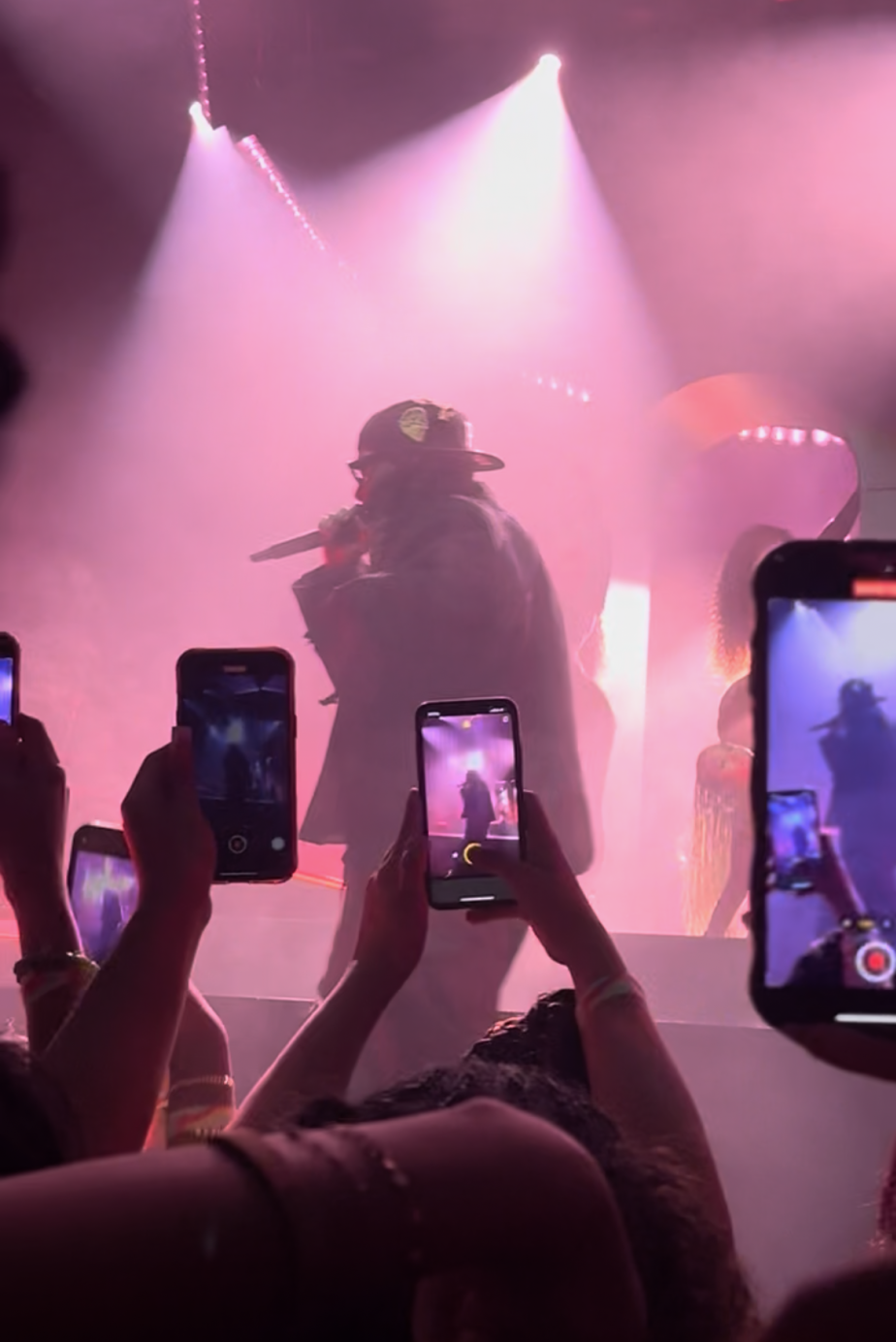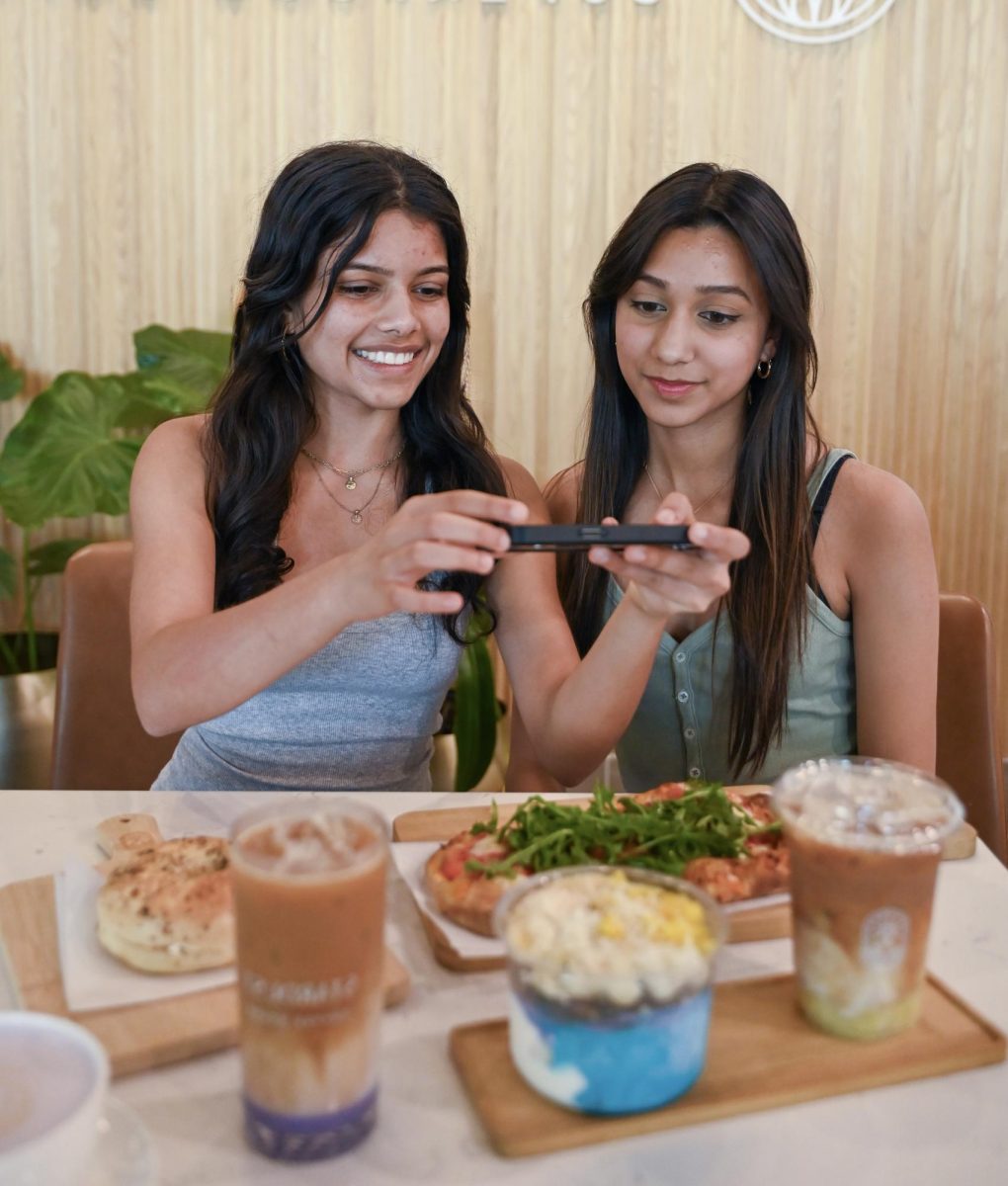Manufactured authenticity: What’s real?

“Everyone put your hands in the air!”
In a packed, laser-lit concert venue, hundreds of hands reach up toward the ceiling. Instead of carefree palms waving to the rhythm of the music, nearly every hand clutches a phone or camera, straining to record the performance. Concert-goers’ eyes fix to their phone screen, desperately trying to capture the best angle to post on social media.
Nowadays, whether it’s at a concert, shopping center or restaurant, phones and cameras are everywhere. Rather than focusing on the present and experiencing each event live, people often record and take pictures with the intention of watching at a later date.
“Filming detracts from happiness,” junior Laya Sunkara said. “You’re not focusing on this thing that you’ve been so excited about, and you’re not focusing on those emotions and absorbing them while they’re lasting. You’re trying to preserve them for later without realizing that you’re not enjoying them in the moment.”
When at an event with others, prioritizing filming over interaction may also weaken social connections. Although filming seems like a harmless way to document memories for later access, English teacher Pauline Paskali cautioned against constant recording.
“If all we do is focus on experiencing the world through a lens, it’s a loss of our connection to the world, to people, to being able to look someone in the eye and talk to them to see their nuanced expressions,” Dr. Paskali said. “If you’re looking through a lens or an iPhone, you’re focused on the composition — the lens doesn’t see what you see. What you see in person is part of what makes us human beings.”
While some feel recording dilutes experiences, senior Lucas Chen sees the process of capturing his life through film as an enhancement. He started a social media account at the start of senior year with the goal of documenting connections and memories with all the members of his class, even those outside of his friend circle.
“Taking photos definitely doesn’t detract from the focus of the conversation,” Lucas said. “If anything, it adds more depth to the interaction you’re having, because it’s meaningful to the point where you think that it’s worth taking a photo and remembering. You’re having more people interact with each other, and that moment of ‘smile’ just spreads joy.”
For Dr. Paskali, wanting to photograph and record experiences is inevitable in today’s digital world, and she believes that there’s nothing wrong with wanting to share that with others on social media. She offers a compromise: taking a few pictures or videos to look back on later, but then putting the phone away to fully engage with the people and that experience.
“If you’re trying to experience a moment and if you’re fortunate enough to be in a beautiful place or listening to beautiful music or at an art exhibit or at a dinner with your friends, your presence is probably more valuable than anything else,” Dr. Paskali said. “If you’re worried you’re going to forget, then take a quick snapshot and then put the phone away. You would have a more meaningful experience if you’re present to the people and the experience around you.”
“The camera always eats first.”
Junior Laya Sunkara jokes as she arranges food carefully at a restaurant to take pictures for her food review Instagram account. She snaps photos at every angle, checking her camera roll to ensure her shots are aesthetic before finally digging into the delicious meal.
Food photography rose in popularity on social media in the 2010s and since then has trickled down to non-influencers — instead of tasting the dish as soon as it’s served, people first try to capture the perfect shot to post on their page. Today, the phrase takes on a broader meaning: the act of documenting and creating an online persona.
Social media, which began as a tool for connection and personal expression, has morphed into a stage for performance. Sophomore Ava Ding pointed out that social media posts have become increasingly curated, each photo painstakingly picked to impress or build up their online standing.
“At its core, social media is mainly to keep in touch with your close friends and just have an online diary for you to post about your life,” Ava said. “But now, there’s an entertainment aspect to it. Influencers, who a lot of people look up to, their life seems very perfect. Young and impressionable people like us see that and feel the need to also show off our perfect lives to everyone.”
When scrolling on social media, Laya’s feed overflows with influencers like Becca Bloom, a wealthy socialite whose videos often showcase her wealth. Creators like her maintain an aspect of accessibility and relatability while carefully curating their content to show an ideal life.
“Subconsciously, everybody wants to be like celebrities, even if it’s on a smaller scale,” Laya said. “That can sometimes be damaging because you’re putting so much time and effort into these things with the ultimate goal of people noticing. If people don’t notice, it’s damaging to your mental health and to your self-esteem.”
Laya adds that social media creates a harmful loop where people constantly seek gratification, and when they do not feel satisfied with the likes or views they receive, they continue posting more. This content is often less genuine than before, as the poster changes their online presence in the search for appreciation.
“People want appreciation for anything that they’re doing,” Laya said. “There’s that sense of jealousy of seeing other people doing things or being aesthetic and getting attention. That cycle has been repeated so many times that people feel the need to share this information now with others so that they can get noticed.”
This phenomenon only heightened with Gen Z’s growing consciousness of how they portray themselves on social media in the digital age. As a result, every post becomes more deliberate, with many users overthinking how a single picture or comment might impact their reputation.
“I’ve seen social media go from there being no filter between what you thought and what you put on the internet because there were no consequences,” Business and economics teacher Patrick Kelly said. “Now it seems like Gen Z knows that your digital footprint is going to stay with you forever.”
Social media influencers have transformed the purpose of social media from sharing life experiences to selecting meticulous posts backed by complex marketing strategies. Kelly, who runs a YouTube channel with over 100,000 subscribers, points out the profitability of appearing candid on social media.
“Authenticity plays well on the internet,” Kelly said. “It’s a low-friction way to translate your real self onto the internet. It’s almost like your digital product, except your product is yourself. The more cohesive you are with the things that you present, the more your audience knows what to expect from you.”
While some social media users continue to curate the perfect posts, others take a more authentic approach. By challenging the norm, people can share their lives without pressure, seeing their social media in a more healthy light.
“It should be a social connection you have where you’re sharing your life with the people around you,” Ava said. “You don’t necessarily need to show off or try to be super cool or aesthetic. Your friends and people who are close to you don’t see you that way, so I don’t see a reason for you to paint that picture of yourself in that way online.”




